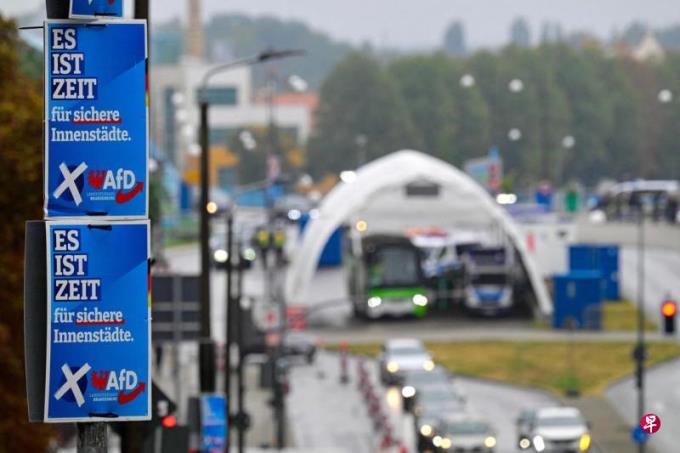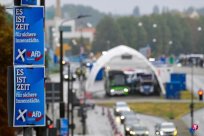
Recently, the Extreme Selection Party (AFD) of Germany's extremely right -wing (AFD) ranked first in the Turinen Election with a voting rate of 32.8%. It was the first time that extremely right -wing parties had become the German state -level election after the end of World War II.The first party.This result revealed that after the unity of Germany, the former East Germany region's deep -seated problems in social economy and politics surfaced.Although the unification of the two Germany has been unified for more than 33 years, the gap between the economic development, social identity and political emotions between Dewed and Desi still failed to be effectively brought.
Since unification, the former East Germany region has been facing the dilemma of economic development lag.Although the federal government has continued to invest a lot of resources in the district to try to reduce the economic gap between the East and West, these efforts have not fully reflected in the daily life of the former East German voters.Many former East and German residents believe that when the federal government has failed to fully consider the actual needs of the local area when dealing with problems such as economic inequality, employment opportunities, and reduction of social welfare.This economic deprivation has exacerbated the dissatisfaction of Dedong voters to the existing political system and provides an opportunity for the other party to provide an opportunity for the other party.
Alternative selection of the party successfully shaped itself as a "protest party" for anti -construction and anti -immigrants by using these socio -economic contradictions, and gradually won the support of a large number of voters.Its extremely right -wing policy advocates, especially on issues in immigration and national identity, to caters to voters who oppose the globalization, immigration policies and climate change policies.The victory in the Tulingen State Election has made the other party's first party in the first election of the state, highlighting the drama of the political pattern of the former East Germany region.
Traditional German political parties perform poorly in this election.The voting rate of the left -wing party and the Social Democratic Party (SPD) plummeted, indicating that the support foundation of the left -wing parties in eastern Germany has been significantly weakened.Although the left -wing party was the most influential political force in the Didong region after the reunification, with the changes in social and economic conditions and the change of voters' needs, the influence of the left -wing party gradually declined.
The Christian Democratic Alliance's voting rate in this election has increased, ranking the second largest party.Although the CDU has a certain influence in eastern Germany as a conservative party, it cannot prevent the fact that the other party is the largest party to become the largest party.This phenomenon shows that De Dong's voters are moving towards a more radical and extreme direction in political choice, so the CDU also faces huge challenges.
At the same time, the newly established political party alliance of left -wing politicians, Sarah, ranked third in the third largest party with a rate of 16%.The political party combines economic and cultural conservativeism. This position attracts voters of different camps, especially voters disappointed with traditional left -wing party.The rise of Sarah not only split the left -wing camp, but also further exacerbated the fragmentation of the German political spectrum.
Mainstream political parties must make adjustments quickly
Extraordinary selection of party success has a profound impact on German politics.Under the framework of multi -party systems, German mainstream political parties have long relied on the strategy of isolation of extreme political parties to maintain political stability.However, with the success of the alternative party in the Dadong region, this isolation strategy is facing a severe test.The mainstream parties faced the swaying of the other party when they selected the party. They have not been able to attract supporters through cooperation, nor can it effectively curb its expansion momentum.Nowadays, the rise of alternatives to the party has become the embodiment of the internal tension of the German democratic system, revealing the spread of populism in the context of globalization and digitalization.
The formation of this situation reflects the long -term social and economic dilemma in the DEET area, and also highlights the drama of voters' behavior.The traditional left and right wings can no longer fully explain the current political reality, and voters are increasingly inclined to make choices based on specific issues and policies, rather than divided according to the party.This makes Germany's political territory more complicated, and the tide of extremism also allows the democratic system to face unprecedented challenges.The success of the other party in Turinen is not only a regional phenomenon, but also a concentrated manifestation of the gap between the East and West, social loss, and voters' behavior changes since the unity of Germany.Faced with this situation, the mainstream political parties in Germany need to make adjustments quickly.The German political party system may need to explore new alliances and cooperation models to break the current political deadlock.In the future political pattern, how to stabilize the situation without the direct cooperation with alternative parties will become a key challenge for mainstream political parties.
The author is Malaysian data engineer, former media person




